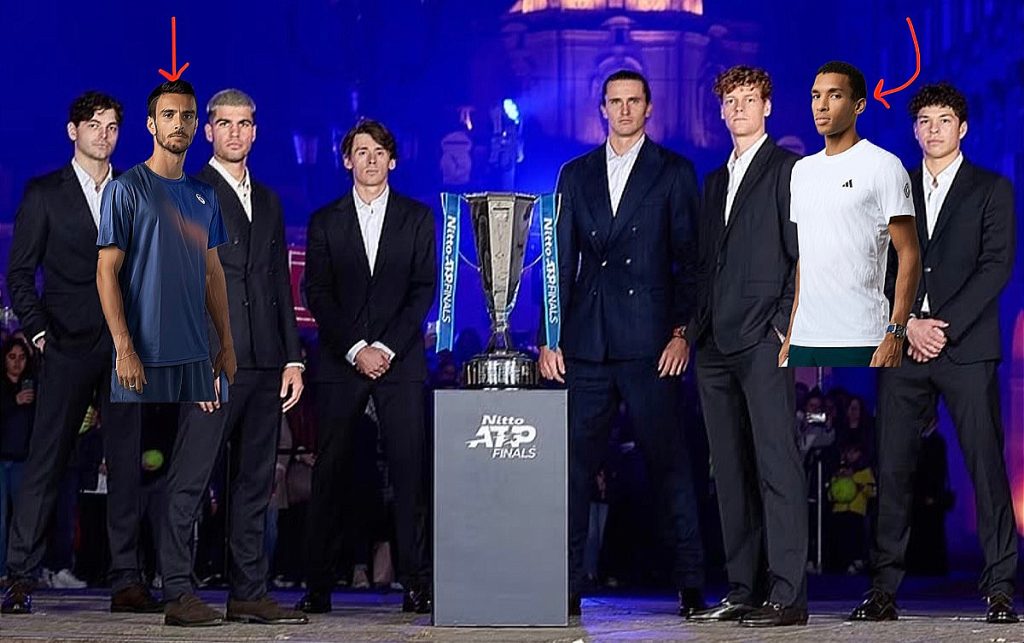
–
It was a day ending in “y”, so tennis will bring the drama.
But on Saturday, in Athens and Riyadh and Turin (and even Metz), there were extra double-helpings of it.
And beyond the tennis, which was pretty great, the drama … wasn’t great. That it all happened pretty much simultaneously is just another … tennis thing they truly should work on.
Here’s Part II: Waiting for Djoko
*********************************************
It’s a few days before the start of the ATP Finals in Turin, the prestige event of the season on the men’s tour and a big source of its revenue.
They put on the dog for this thing, notably in the preamble where there are photo shoots in iconic locations, media day, graphics to put together, cute social-media content – all in anticipation of the Sunday start. Not to mention the official draw on Thursday, which would decide the two pools for the six-day round-robin portion.
One big problem: of the eight players who qualified in singles, only six were actually in the house.
And one of the eight was still unknown.
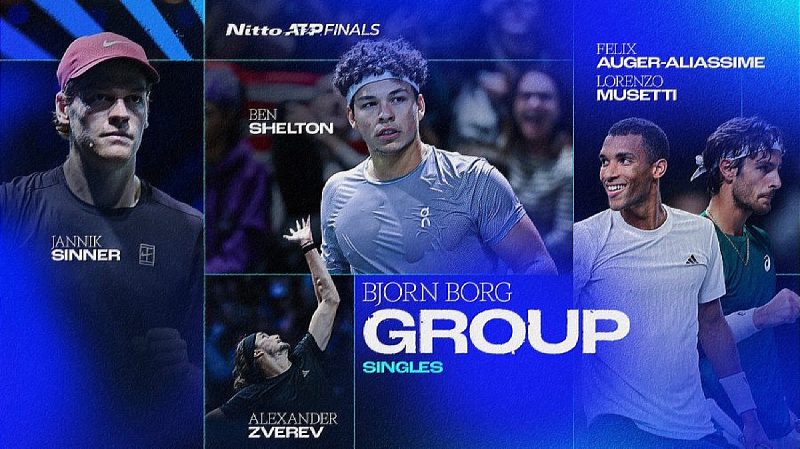
It was, to say the least, far from ideal even if it was entirely the ATP’s own fault in the end.
But the series of events that unfolded on Saturday was a buffet of conflicts of interest that, in a nutshell, kind of explains professional tennis.
Uncertainty to the last
To start, we should make clear that none of this is Novak Djokovic’s fault. These were the circumstances, and he coloured well within the lines.
But it all revolved around him.
Lorenzo Musetti’s early exit at the Paris Masters and Félix Auger-Aliassime’s run to the final meant that the Italian took a late entry into the Hellenic Championships in Athens, Greece to try to get enough points to pick off the eighth and final spot in the year-end championships.
He was the No. 2 seed. But he had to win the tournament to make it, on a slim technicality that involved the removal of his 10 ranking points from the Paris Masters, which would be replaced by the Athens result. Without that, he would have made it with five points to spare by making the final. With that, he’d be five points short if he didn’t take the title. That’s how slim the margin was, even after an entire season of hard work.
Auger-Aliassime, who had entered the concurrent tournament in Metz, France as a “safety” tournament, decided not to play it after all. He’d been dealing with a recurrence of knee pain and other issues in Basel and Paris and not only did he not want to aggravate anything, he smartly decided that even if he made a run and sealed the qualification, he wouldn’t be physically fit to give a decent effort in Turin.
Besides, with Djokovic in the Athens event and Musetti sort of limping to the finish line (figuratively) in sub-par form, there was every chance the Italian wouldn’t win the tournament. So Auger-Aliassime rolled the dice, with house odds on his side.
The Canadian was already in Turin, practicing hard with all the other top players, because he would at the very least be the first alternate.
But because he hadn’t officially qualified, he wasn’t in any of the photo shoots and assorted other content. Even though there was every chance he’d make it.
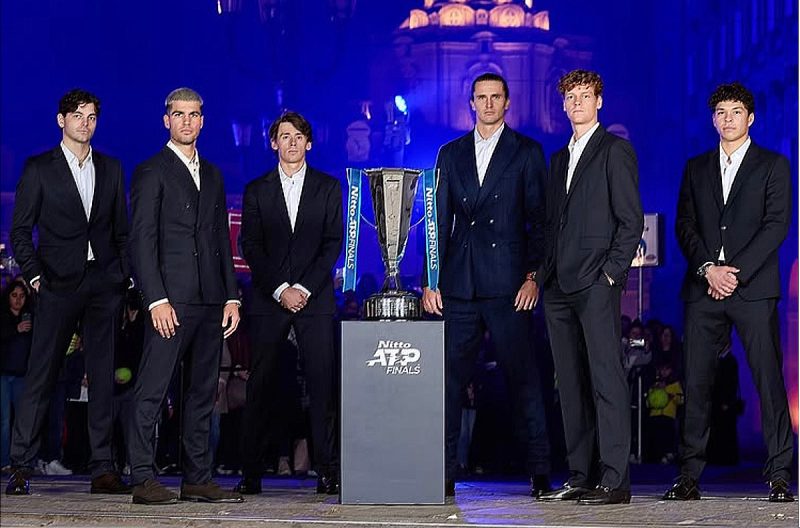
Tearing up the schedule
The “eighth spot” was drawn into the pool with Jannik Sinner on Thursday. And the order of play for Monday had “[2] Jannik Sinner vs. [8] Unknown”
And because the eighth slot and Novak Djokovic were drawn into different pools, the logical and longstanding schedule of having the pools play on alternate days was blown up. You could not have one or both play in Athens on Saturday evening only to have to travel to Turin, barely get a practice, and play their opening round as early as Sunday afternoon.
So they had to split them up. And that means that some players will have to play back-to-back days, and others will have two days between their first and second matches.
And Sinner still didn’t know whom he would face.
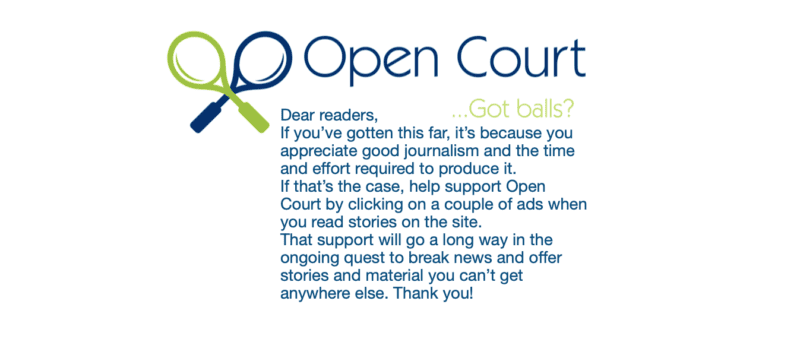
Back to Athens, a conundrum for Djokovic
Meanwhile, back in Athens, Djokovic found himself in a real pickle.
The 38-year-old superstar, whose family owns the beleaguered ATP Tour event that was formerly in Belgrade, cancelled for a few years, revived – and relocated to Athens just three months ago saddled with a highly uncertain future – knew that his participation was a crucial element for the tournament.
That was especially true after home-country hero Stefanos Tsitsipas was unable to play.
Were it not for this tournament, Djokovic likely would have pulled the plug on his 2025 season after his surprise appearance in Shanghai. But since he essentially had to play Athens, he kept the option open to follow it up with the ATP Tour Finals. That’s an event the has qualified for 18 times and won seven times, going back to 2008 when it was called the Tennis Masters Cup. Most recently, he won back-to-back titles in 2022 and 2023. Of his $170 million in career earnings, more than $23 million has been earned at the season-ending championships.
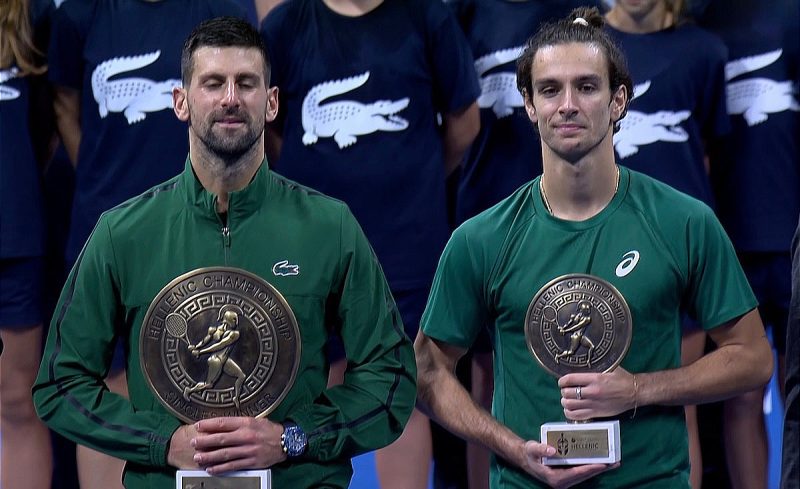
Personally, we predicted he would not play, for many reasons. Part of it was simply the fact that the week in Athens, which he has adopted as his family’s new home, was going to be a busy one. The other part is that he has played so little tennis that going from that and expecting to follow up in Turin, where every opponent would be a top 10 player and where he would have to get through both Carlos Alcaraz and Jannik Sinner to win the title, was an extreme longshot.
And these days, Djokovic doesn’t enter tournaments unless he thinks he can win.
At this stage, Djokovic has also earned the right to a few perks – senior’s discounts, if you will – and did not commit to playing in Turin. It was impressive enough that he easily qualified after playing just 12 tournaments going into Athens.
Italian federation president jumps the gun
To add a little more intrigue to the story, Italian Tennis Federation president Angelo Binaghi announced last week that Djokovic would be playing.
Where he got that information is unclear; perhaps he was just trying to feed the media beast. But Djokovic had to quickly clarify that he hadn’t made a decision yet. He would decide after the Athens tournament was over.
Which, in turn, led to a conflict-of-interest mess he had to play perfectly.
Rough week in Athens
Djokovic had a good draw in his new hometown tournament. As the No. 1 seed, he had a first-round bye. And given this late slot in the schedule, the field wasn’t that deep.
He got through Cana-Chilean Alejandro Tabilo, injured No. 6 seed Nuno Borges and qualifier Yannik Hanfmann in straight sets.
But the rust was evident. As extraordinary a player as he remains at age 38, it’s a lot tougher than it used to be for the Serb to get through even mid-level players without a fair bit of effort.
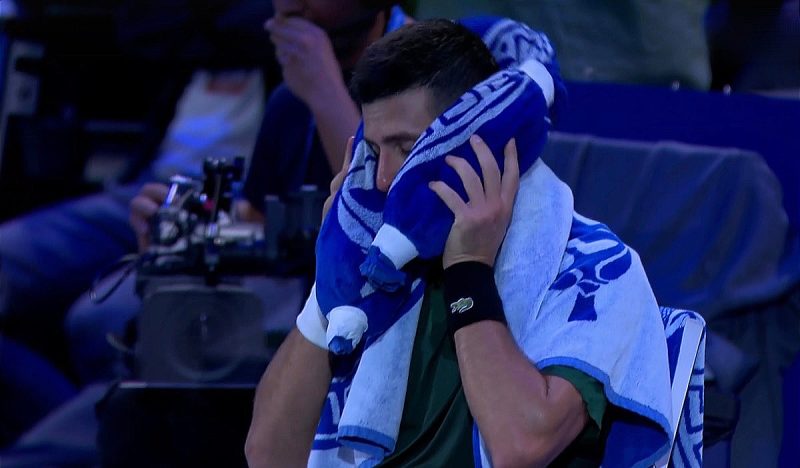
Cue up the final.
And that’s where his conundrum came in. So many hypotheticals, but all within the realm of the possible.
As a tournament owner, he knew that the best seller for the final, in a so-so field, was a matchup between two top-10 players and top two seeds. So he needed to get there, and he needed Musetti to also get there.
And, once he reached the final, there was even more incentive to keep that to himself. Because if he didn’t play, then Musetti could very easily withdraw. He would be officially qualified and would want to save his energy for his career debut at the big event in his homeland. But he also had to play, because there was a full house waiting.
But if he tells Musetti and they agree to play the match anyway, it’s literally no better than an exhibition. And that cuts to the integrity of the competition, and the duty to the fans, sponsors and the sport to compete honesty and fairly.
Not only that, with all the “ifs” and “we hopes” featured during the trophy ceremony speeches, it was pretty clear that the event – which was well-attended and well run by Djokovic’s youngest brother Djordje – was on tenterhooks in terms of its future. Him winning it would be very meaningful not only as the 101st title of his career, but also going forward. The tournament is not on the already released 2026 schedule, although there is a “TBD” for a second event the week before next year’s Tour finals.
It was a significant conflict of interest. But there’s nothing stopping a player from having a financial interest in a tournament. He wouldn’t have asked to be in this position, but there was nothing sketchy about it.
Gave it 150 per cent effort
And so, they played.
Djokovic was really scuffling. As has increasingly been the case in recent years, he struggled to recover after even relatively short rallies. He pumped himself up. He bellowed at his people.
It wasn’t hot in Athens Saturday – 20C at match time – and yet Djokovic was making liberal ice of the ice towel. You don’t see ice towels indoors much, if at all. But he was wrapping himself in them on changeovers. He huffed and puffed and bellowed and hit the deck and battled.
Musetti, whose only (relative) success against Djokovic has come on clay, played brilliantly. Except for a few moments where the possibility of winning was real, and it was almost though as he flinched at the magnitude of that.
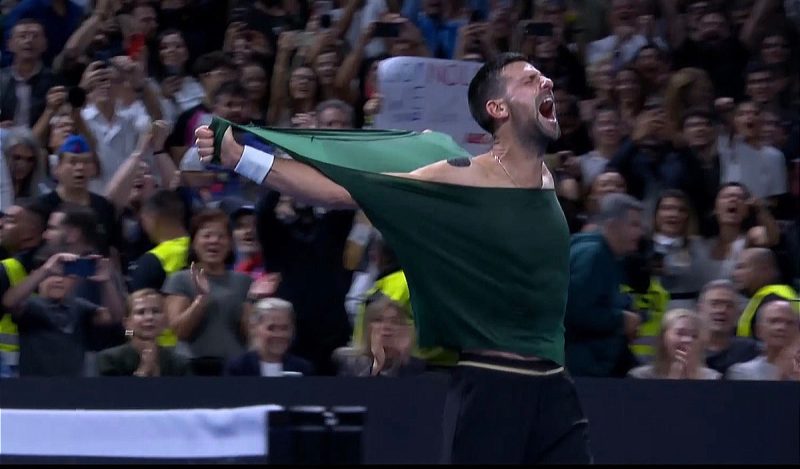
Djokovic pulled it out – 4-6, 6-3, 7-5 in just a few seconds short of three hours. And the reaction was like he won a biggie – one of the rare Incredible Hulk shirt rips of recent years.
It was only Djokovic’s second title this season – the first was when he dropped another absolute heartbreaker, this time on Hubert Hurkacz in Geneva (5-7 7-6, 7-6) in another ATP 250 tournament the week before Roland Garros. Djokovic has played just 13 tournaments in 2025; the only summer events he competed in were Roland Garros, Wimbledon and the US Open, and he was stopped at the semifinal stage in all three by either Carlos Alcaraz or Sinner.
At the net, he let a hugely disappointed Musetti in on his not very well-kept secret: he wouldn’t be playing Turin, and Musetti qualified anyway.
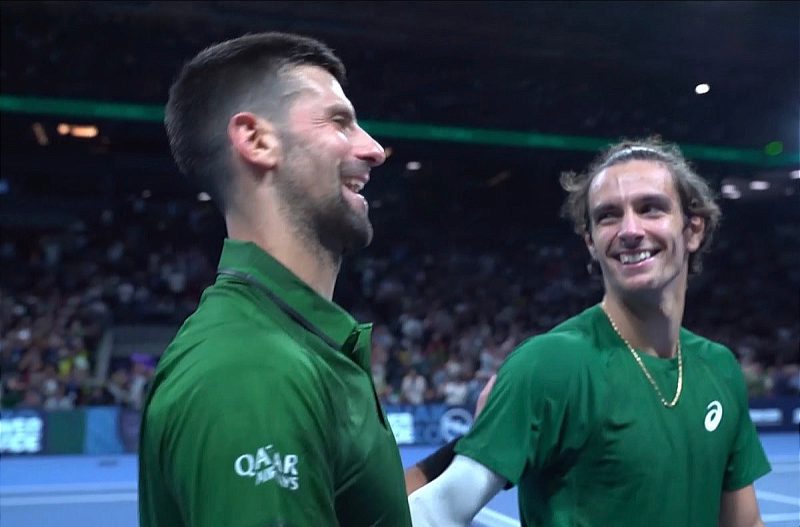
The ATP Tour was definitely prepared. It was just shortly after Musetti announced this news at his post-match press conference, and after Djokovic had posted on social media, that they posted this announcement.
The official reason was a shoulder injury. Djokovic had been playing with tape on his right shoulder.
And so, Auger-Aliassime is the original qualifier. But he draws Jannik Sinner in his opener while Musetti, replacing Djokovic in the other pool, gets Carlos Alcaraz – and Taylor Fritz in his opening match.
Alexander Bublik becomes the first alternate. And then, after some scrambling, Casper Ruud heads to Turin, after finishing 12th in the race.
It worked out, except …
The situation this year led the ATP Tour to finally make a long-overdue change.
Starting in 2026, the race for Turin will end with the Paris Masters. As it used to. As it always should have.
For a time, there was a week between Paris and London, where the ATP Finals were held for many years. That gave the qualifiers that week to practice, adapt to the conditions, and do all of the off-court public-relations stuff that helps build up anticipation for the event.
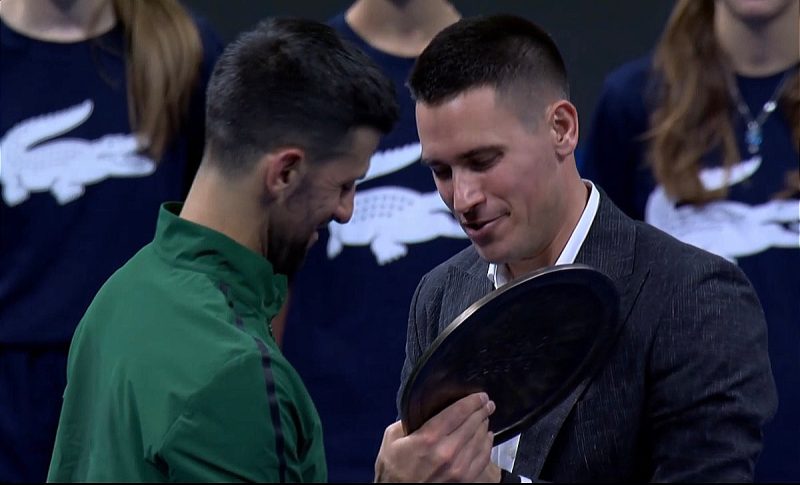
In a laudable but misguided attempt to try to shorten the season a little, that week was crossed out for a time. And so there were situations back in 2012 and 2013 with players – singles and doubles both – still fighting it out in Paris, and missing from all the official events and arriving with little prep time.
But money talks, and so does the relentless moving around of smaller events on the ATP schedule to accommodate the expanded Masters 1000s and other considerations.
The other tournament last week, The Moselle Open, began in 2003 but is in its final edition this year. (The ATP plans to move the Stockholm event into that slot for 2026). It had always been held in September until 2023, when it was moved into this “kiss of death” slot.
As hard as it is to draw the top players an ATP 250 event needs to survive at end of the season, the fact that this week on the schedule will no longer be relevant in the last-minute race to qualify in Turin will make it even more of a lame-duck week.

More Stories
WTA Rankings Report – As of Nov. 10, 2025
ATP Rankings Report – As of Nov. 10, 2025
Canucks This Week – Week ending Nov. 16, 2025 (Monday results)